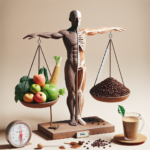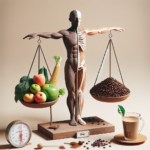
#ez-toc-container {
background: #f9f9f9;
border: 1px solid #aaa;
border-radius: 4px;
-webkit-box-shadow: 0 1px 1px rgba(0, 0, 0, .05);
box-shadow: 0 1px 1px rgba(0, 0, 0, .05);
display: table;
margin-bottom: 1em;
padding: 10px 20px 10px 10px;
position: relative;
width: auto;
}
.ez-toc-container-direction {
direction: ltr;
}
.ez-toc-list-level-1 a{
font-weight:bold;
}
Table of Contents
1. Introduction: The Surprising Link Between Espresso and Calorie Burning
Over the past few decades, there has been a notable surge in the global appreciation for coffee, particularly espresso. Espresso has transformed from being just an energizing start to one’s morning into a cultural phenomenon shaping social interactions, influencing lifestyle choices, and now, even contributing to discussions on health and wellness.
The explosion of espresso culture worldwide can be attributed to its rich flavor, intense aroma, and the craftsmanship involved in its creation. As cafes blossom on every corner of major cities and social media abounds with aesthetically pleasing shots of espresso, the allure of this concentrated coffee variant shows no signs of waning. But beyond the social and sensory pleasures it offers, espresso may also possess remarkable properties that aid in weight management—an aspect that is gaining considerable interest in health circles.
The Surprising Link Between Espresso and Calorie Burning
Espresso is not just a strong shot of caffeine; it contains a complex mix of natural compounds that potentially influence your body in unexpected ways. Among the myriad of effects, there is a growing body of research suggesting that espresso can play a crucial role in weight management. In an era where obesity is a global concern, uncovering the potential benefits of espresso in calorie burning and weight reduction can be a game-changer.
- Espresso can boost metabolism: The caffeine present in espresso is well-known for its stimulating effects. By accelerating the central nervous system, caffeine temporarily enhances your metabolic rate, aiding in faster calorie burning even at rest.
- Increased fat oxidation: Studies have shown that caffeine can enhance the body’s ability to utilize fat as a fuel during exercise.
- Appetite suppression: Espresso may act as an appetite suppressant, reducing cravings and assisting in caloric intake management.
As espresso cements its place both in our daily routines and scientific discussions, it’s important to delve deeper into how this beloved beverage influences our metabolism. Understanding these dynamics not only enhances our appreciation for espresso but also equips us with knowledge to make informed dietary choices. While espresso alone is not a magic solution for weight loss, it can be a valuable part of a comprehensive approach to maintaining healthy body weight.
The subsequent sections will provide a detailed exploration of how espresso consumption can affect metabolism and assist in weight management. From biochemical pathways to practical insights, we will uncover the intricate link between a cup of espresso and its potential calorie-burning benefits.

2. The Science Behind Espresso’s Caloric Impact
Espresso is a beloved beverage for many, often celebrated for its bold flavor and invigorating effects. Beyond the immediate pleasure it provides, espresso also has fascinating implications for metabolism, primarily due to its key components. Diving into the science behind espresso’s caloric impact reveals insights into how it can influence metabolic rate and fat oxidation, contributing to calorie burning.
The Components in Espresso Affecting Metabolism
When it comes to metabolic effects, espresso is largely defined by its caffeine content. This potent stimulant not only energizes the mind but also plays a significant role in influencing how our bodies metabolize calories. Below are some of the primary components in espresso contributing to its impact on metabolism:
- Caffeine: The most well-known and studied component in espresso, caffeine is a central nervous system stimulant that helps increase alertness and energy levels. It is renowned for its role in enhancing metabolic rate.
- Chlorogenic Acids: These are a group of antioxidant compounds found in espresso which can also contribute to various health benefits, including potential effects on glucose metabolism.
- Theobromine and Theophylline: Both compounds are found in small amounts in espresso and can stimulate the heart or dilate blood vessels, potentially contributing to its metabolic effects.
- Vitamins and Minerals: Espresso contains minor amounts of magnesium, niacin, and potassium, which are integral in various metabolic processes.
Scientific Studies Linking Caffeine to Increased Metabolic Rate
The relationship between caffeine consumption and metabolic rate has been the subject of numerous scientific studies. Here’s a closer look at what the research says:
- In various studies, caffeine has been shown to increase the resting metabolic rate (RMR), which means the energy expenditure when at rest. On average, individuals may experience an increase in metabolic rate ranging from 3-11%.
- Research indicates that the increase in metabolic rate is directly proportional to the dosage of caffeine consumed. Higher doses of caffeine are known to produce more significant metabolic effects.
- One study found that, in lean individuals, caffeine raised metabolic heat production about 13% over a three-hour period, emphasizing its role in energy expenditure.
- Caffeine affects thermogenesis, the process of heat production in organisms, which further contributes to an increased caloric burn.
Caffeine’s Role in Enhancing Fat Oxidation
Caffeine’s impact goes beyond just increasing the number of calories burned; it also affects the types of calories burned. Specifically, caffeine is known to enhance fat oxidation, which is the body’s process of breaking down fat stores into energy.
- Upon ingestion, caffeine increases the concentration of circulating free fatty acids by stimulating lipolysis, the breakdown of fats into fatty acids and glycerol.
- The increased availability of free fatty acids makes them more readily available to be utilized as a fuel source in place of or in addition to glycogen, thus enhancing fat oxidation.
- This metabolic shift to enhanced fat oxidation can be particularly beneficial during physical activities, where a greater proportion of energy burned comes from fat.
In conclusion, the presence of caffeine in espresso not only boosts metabolic rate but also facilitates fat oxidation, which in turn aids calorie burning. This implies that moderate consumption of espresso could potentially contribute to weight management and metabolic health. However, it is essential to consider individual variations in response to caffeine and the importance of moderation to avoid negative side effects.
Through a combination of increased metabolic rate and enhanced fat oxidation, espresso offers intriguing metabolic effects that go beyond its delightful taste. Future studies continue to explore the depth of its impact, offering coffee lovers more reasons to savor their favorite brew.

3. Espresso: A Metabolic Booster?
Espresso is not just a concentrated shot of coffee; it is a potential metabolic booster that has garnered attention for its ability to enhance both mental and physical performance. As more health enthusiasts and athletes explore natural ways to improve their overall health and function, espresso emerges as a candidate worth considering. In this piece, we dive into how espresso shots may impact your metabolism, the optimal timing and quantity for consumption, and the role of individual differences in metabolism and caffeine sensitivity.
Espresso and Mental Performance Enhancement
One of the most immediate effects of consuming espresso is its impact on mental alertness and cognitive function. The caffeine in espresso interacts with the brain by blocking adenosine receptors, which can lead to increased arousal, vigilance, and wakefulness.
- Improved Concentration: Espresso can help sharpen your focus by temporarily eliminating the sensation of drowsiness. This is particularly beneficial for tasks that require prolonged attention.
- Enhanced Memory: Studies suggest that caffeine may improve certain memory functions, potentially making it easier to retain information.
- Mood Elevation: As a stimulant, espresso can also elevate mood by promoting the release of neurotransmitters like dopamine and serotonin.
Espresso and Physical Performance
Beyond mental acuity, espresso also has implications for physical performance enhancement. Athletes often use caffeine, found aplenty in espresso, for its beneficial effects on endurance and strength.
- Increased Stamina: Caffeine can enhance endurance by postponing fatigue and increasing exercise endurance through elevated adrenaline levels.
- Fat Mobilization: Espresso may aid in fat breakdown, making it an ideal pre-workout shot to improve energy use efficiency.
- Strength Enhancement: Some studies indicate that caffeine may lead to a small but significant increase in performance during repetitive high-intensity efforts.
Timing and Quantity for Optimal Metabolic Benefits
When considering espresso consumption for metabolic improvement, timing and quantity play crucial roles. Here’s a structured guide to maximize benefits.
- Timing: Consume espresso approximately 30 minutes before engaging in physical or mental tasks. This allows time for caffeine to reach peak blood levels.
- Quantity: Start with one shot of espresso to gauge your body’s reaction, particularly if you’re sensitive to caffeine. Generally, 1-2 shots are sufficient for most adults.
- Consistency: Regular consumption at the same time each day can help your body adjust and optimize the metabolic benefits of espresso.
Individual Differences in Metabolism and Caffeine Sensitivity
Not all bodies react the same way to caffeine, and understanding individual differences in metabolism and sensitivity can help tailor espresso consumption to your needs.
- Metabolism Variability: Genetic factors greatly influence how quickly or slowly the body metabolizes caffeine. Some people may experience prolonged effects, while others might process caffeine rapidly.
- Caffeine Sensitivity: Some individuals have a heightened sensitivity to caffeine, leading to side effects such as jitteriness or anxiety. These individuals should consider smaller doses or opt for decaffeinated alternatives.
- Body Weight and Composition: Heavier individuals or those with a higher muscle mass may require slightly more espresso for the same effect, compared to lighter individuals.
In conclusion, espresso is more than a delicious beverage—it’s a potent metabolic agent capable of enhancing performance in numerous ways. By understanding the timing, quantity, and individual sensitivities related to caffeine, one can tailor their espresso consumption to achieve maximal metabolic and performance benefits. As with any supplement or dietary change, it’s always advisable to consult with a healthcare professional to ensure safety and efficacy in your health regimen.
4. Incorporating Espresso into a Healthy Lifestyle
Incorporating espresso into a healthy lifestyle can be both an enjoyable and beneficial practice when done thoughtfully. Espresso, a concentrated form of coffee made by forcing hot water through finely-ground coffee beans, is rich in flavor and packed with antioxidants and caffeine. When integrated into a balanced diet and active lifestyle, espresso can support weight management and enhance physical performance. However, it is essential to consume it in moderation to avoid the side effects of excessive caffeine intake.
Tips for Integrating Espresso into a Balanced Diet for Weight Management
For those looking to manage their weight, espresso can provide a calorie-free energy boost that helps maintain focus and alertness. Here are some tips to effectively include espresso in your weight management plan:
- Calorie-Free Energy Boost: Unlike many sugary energy drinks, espresso contains minimal calories. Opt for plain espresso rather than sweetened coffee beverages to keep your calorie intake low.
- Use of Natural Sweeteners: If you prefer your espresso sweetened, consider using natural sweeteners like stevia or monk fruit. They provide sweetness without the added calories and carbohydrates of sugar.
- Timing Your Espresso: Consuming espresso before a workout can give you an energy boost, enhance endurance, and increase calorie burning.
- Pair with Protein and Fiber-Rich Foods: To help sustain energy levels throughout the day, pair your espresso with a protein and fiber-rich meal or snack, such as a boiled egg or a slice of whole-grain toast.
Suggestions for Pairing Espresso with Physical Activities to Maximize Calorie Burning
Espresso not only enhances mental alertness but can also be an excellent companion to physical activities. Consuming espresso in conjunction with exercise can help maximize calorie burning:
- Pre-Workout Espresso Shot: Consider taking a shot of espresso 30 minutes before hitting the gym. The caffeine in espresso can improve your stamina and performance, allowing you to train harder and burn more calories.
- Postcardio Espresso Break: After an intense cardio session, enjoy a cooling-down moment with a well-timed espresso. Its antioxidant properties may help in muscle recovery.
- Mid-Hike Espresso: For those long hiking days, packing a thermos with espresso can provide a refreshing energy boost to keep you going.
- Espresso-Paired Yoga: The mental focus provided by espresso can enhance the mindfulness required during yoga sessions, making it a perfect pre-yoga beverage.
The Importance of Moderation and Potential Side Effects of Excessive Caffeine Consumption
While espresso can be a valuable component of a healthy lifestyle, it is crucial to consume it in moderation. Excessive caffeine intake can result in various side effects that can offset its benefits:
- Potential Side Effects: Overconsumption of caffeine may lead to insomnia, jitteriness, increased heart rate, and digestive issues.
- Daily Caffeine Limit: It is generally recommended to limit caffeine consumption to 400 mg per day, which is roughly equivalent to four 1-ounce shots of espresso.
- Pay Attention to Symptoms: Be attentive to how your body responds to caffeine and adjust your intake accordingly. If you experience any adverse effects, consider reducing your espresso consumption.
- Hydration is Key: Remember to stay hydrated alongside your espresso consumption, as caffeine has a diuretic effect, which can cause dehydration.
By incorporating these tips and maintaining mindful consumption, you can harness the benefits of espresso to support your healthy lifestyle endeavors. Enjoy it as a flavorful pick-me-up that complements both your dietary and physical activity plans.


